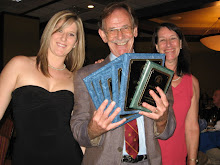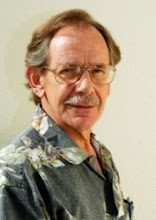He came up with some of the best lines in the language. "Hitch your wagon to a star" ... "The shot heard around the world"... "Build a better mousetrap."
He was Ralph Waldo Emerson (1803-1882), the New England poet and Transcendentalist. His latest biographer is Robert D. Richardson, who has just followed up his tremendous "Emerson: The Mind on Fire" with a little book called "First We Read, Then We Write: Emerson on the Creative Process" (Univ. of Iowa Press).
Bob Richardson is a local Key West writer, incidentally married to local Key West writer Annie Dillard. As for my own reading and writing, I know enough to be dangerous.
Some fun, then, as we take a look at the true wonder of modern American diction and marvel at how it came to pass through Emerson.
The first revelation in "First We Read, Then we Write" is the degree to which Emerson, especially in his essay "The Poet," goes into matters so vital to writing today. The 19th-century Emerson, with his huge, rolling style - it makes syntax sound like deep breathing - has managed to be crucial to an understanding of our monosyllabic 21st century sentences.
That is because he knew what he was talking about. Meaning that, in Richardson's words, he aimed to deliver "the thing behind the words." Writing, for Emerson and for the future of the American voice, has depended on "proper creation," what Jack Kerouac called "first thought best thought" (first as in leading thought), the ability to reveal from within the image its message for real.
Not an easy thing to get across, nor to do. One feels Emeron's enormous presence looming over Richardson's shoulder as he sat absorbing Emerson's own endless reading and writing in order to, at the last, with brilliant insight, distill it into one central idea: How we use language in America. (Bob can take the looming presence; he has already written two masterful biographies on William james and Henry Thoreau.)
It all begins with reading and it is something that happens to all of us at one time or another in ourt lives. We encounter a book that appears to have been written just for us, whose intoxication seems exclusively our own. And, "having exhausted that cup of enchantment," concludes Emerson, "we go groping in libraries all our years afterwards in the hope of being in Paradise again."
Everything that has ever been thought can be written, whether by "inspiration, by virtue or vice, by friend or fiend, angels or gin." One day a dream of a book really will get it just right for you and go straight to the heart of your matter.
How it does it will depend on the word and the sentence. "In writing," shares Emerson, "there is always a right word, and every other that is wrong." By this he is not referring to the horror of endless choice but noting that the best and first (meaning winning) word is there to be found. Although the origin of most of the English language is lost in the misty murk, "each word was at first a stroke of genius," says Emerson. And Richardson gives a couple of rich examples of words we do know about: Supercilious, literally "raising of the eyebrow," from "super" meaning raised and "cilia" meaning eyebrow; and the word consider, literally "to study the stars," from the Latin "sidus, sideris," meaning star.
"In good writing," says the master, "every word means something." In other words, no italics in Plato.
And no abstractions. "No idea but in things" is the Modernist version of this, from William Carlos Williams' "Patterson" of 1927. The future is intrinsic to Emerson's point because of the way we have come to favor his tenets. Now we can read such perfect lines as these, from John O'Hara's final verse in his "Autobiographia Literaria" of 1951:
And here I am, the
center of all beauty!
writing these poems!
Imagine!
One of the very last poems by the late John Updike, the one that begins with the line, "All praise be Valium in Jesus' name," follows Emerson's every dictum to create a bittersweet reality grenade of our time:
All would be well, I felt, all manner of thing.
The needle, carefully worked, was in me, beyond pain,
aimed at an adrenal gland. I had not hoped
to find, in this bright place, so solvent a peace.
Days later, the results came casually through.
The gland, biopsied, showed metastis.
Finding the right word in order to say the right thing takes mindfulness and a delight in recollection and possibly an expanded consciousness. Often it is entirely accidental, as when "a glance reveals what the gaze obscures," in Emerson's words. It is best to write as thouh to an unknown friend. "When I write a letter to to anyone whom I love, I have no lack of words or thoughts; I am wider than myself ... but what I write to fill the gaps of a chapter is hard and cold, is grammar and logic; there is no magic in it; i do not wish to see it again."
Ah, yes ... Anyone who thinks writing can be done any old way has got it wrong. First of all there's what Richardson calls the "endless velvet alternatives to hard work." Then there's Emerson's problem of mood. "Our moods do not believe in each other. Today I am full of thoughts and can write what I please. I see no reason why I should not have the same thought, the same power of expression tomorrow." Not a chance.
When a writer does get it right, the clear blue sky is the limit. Every good sentence implies all truth, says Emerson. There's more: "Every one of my writings has been furnished to me by a thousand different persons, a thousand different things." Thus is each one of us emblematic of the whole. "All history," writes Emerson, " is to be explained by each life. This is no abstraction."
And more still: The real writer is compelled to convey everything, believing with Emerson that "all that can be thought can be written, first or last. The writer would report the Holy Ghost, or attempt it." The visible world, then, is the "dial plate of the invisible." We, too, "must write Bibles, to unite again the heavenly and the earthly world."
Here we go to holy ground, beyond even American diction, beyond the beating heart of the people, the call of the meadow or the cry of the cauldron, and directly into the nature of the thing itself: supernatural and eternal.
It is here that we will write what Emerson claimed for us: "America is a poem in our eyes."
This is an impeccable and exalted little book.
Wednesday, April 15, 2009
The Sacred Secret of American Diction
Subscribe to:
Post Comments (Atom)


No comments:
Post a Comment